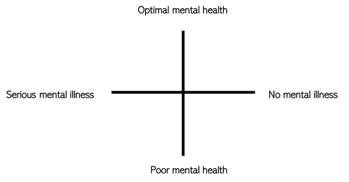01 Jun 10 things you can do to boost your mental health
via Inverse.com by Simon Rosenbaum and Jill Newby
Amid the coronavirus pandemic, we are being warned of a “second wave” of mental health problems that threaten to overrun an already weakened mental health service.
As we emerge from this crisis, while some people may need specialist help with treating mental illness, everybody can benefit from strategies to improve mental health.
This is because mental health is more than just the absence of mental illness. Positive mental health is a combination of feeling good and functioning well.
MENTAL ILLNESS VS. MENTAL HEALTH — Mental health and mental illness are not simply two sides of the same coin. Mental health, just like physical health, exists on a spectrum from poor to optimal.
With physical health, some days we naturally feel stronger and more energetic than others. Similarly, some days our mental health is worse than others, and that too is a natural part of being human. We may feel tired, grumpy, sad, angry, anxious, depressed, stressed, or even happy at any point in time. These are all normal human emotions and aren’t on their own sign of mental illness.
Someone living with a mental illness can be experiencing optimal mental health at any point in time, while someone else can feel sad or low even in the absence of mental illness.
Differentiating between poor mental health and symptoms of mental illness is not always clear-cut. When poor mental health has a sustained negative impact on someone’s ability to work, have meaningful relationships, and fulfill day-to-day tasks, it could be a sign of mental illness requiring treatment.

WHAT DOES POSITIVE MENTAL HEALTH LOOK LIKE? — Mental health is more than just the absence of mental illness.
Positive mental health and well-being is a combination of feeling good and functioning well. Important components include:
- Experiencing positive emotions: happiness, joy, pride, satisfaction, and love
- Having positive relationships: people you care for, and who care for you
- Feeling engaged with life
- Meaning and purpose: feeling your life is valuable and worthwhile
- A sense of accomplishment: doing things that give you a sense of achievement or competence
- Emotional stability: feeling calm and able to manage emotions
- Resilience: the ability to cope with the stresses of daily life
- Optimism: feeling positive about your life and future
- Self-esteem: feeling positive about yourself
- Vitality: feeling energetic.
HOW CAN I CULTIVATE MY MENTAL HEALTH? — Your mental health is shaped by …
… keep reading the full & original article HERE
#happiness #psychology #mentalhealth #resilience #positivepsychology

